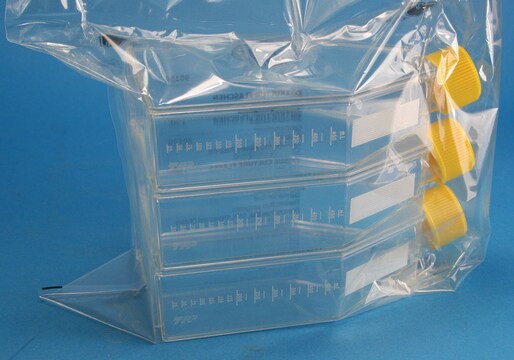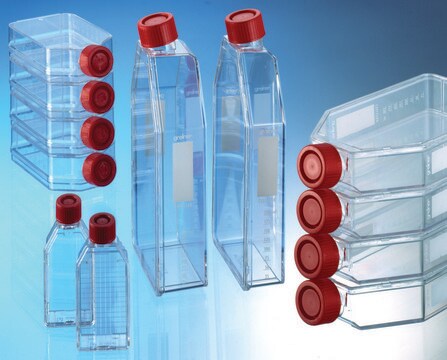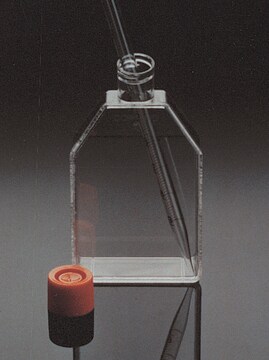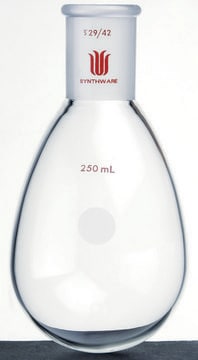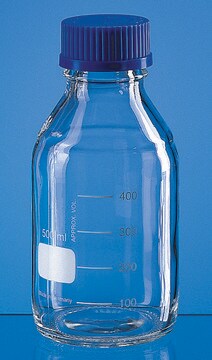Z707562
TPP® tissue culture flasks
Sinónimos:
T300 flask
Iniciar sesiónpara Ver la Fijación de precios por contrato y de la organización
About This Item
UNSPSC Code:
41122104
NACRES:
NB.22
Productos recomendados
material
angled neck
polystyrene
screw top cap
sterility
sterile
sterile
feature
with cap (filtered)
packaging
case of 18 ea
case of 18
pack of 3
manufacturer/tradename
TPP 90301
capacity
410 mL
external L × W × H
270 mm × 170 mm × 45 mm
surface area
300 cm2 , growth surface (cm2)
working volume
30-40 mL
suitability
suitable for (cell culture; tissue culture)
binding type
Tissue Culture (TC)-treated surface
¿Está buscando productos similares? Visita Guía de comparación de productos
General description
The inside surface treatment by TPP provides an optimal growth surface on the flask base for the most varied matrix-dependent tissue cultures. The untreated side and top inside surfaces reduce the amount of cell loss during the separation phases, because undesired tissue adhesion outside the growth zone is diminished. The flask′s innovative shape is of such a design that devices inserted through the flask′s neck have optimal access to the entire base surface. This means that there are no "dead" corners that cannot be reached with pipettes or cell scrapers.
This excellent accessibility is due to the large neck opening and the favorable angle of inclination. The angled neck also reduces the chance of accidental spills and permits "dribble-free" pouring.
When the vented screw cap is tightened to the end position, the closed tissue culture flask is liquid and gas tight. By simply unscrewing the cap one quarter of a turn, the flask is in the "VENT" position, with the inside of the flask being aerated through a defined gap opening. This guarantees that the gas exchange with the environment and the possible risk of contamination are kept to a minimum. In addition, the special flat thread profile of the caps stops excess tightening and thus allows the caps to be re-used multiple times.
The TPP filter cap has a welded membrane in the cap cavity to offer free gas exchange without gas flow alteration. For optimal flask breathing, all membranes are proportionally dimensioned to each cap size. The microporous hydrophobic membrane (cytotoxic free) itself is constructed of 2 layers of membrane material based on a white acrylic copolymer over nylon support. With an airflow rate of 4.5 (LPM/3.7cm2/13.5psi), the gas exchange properties of the filtered flasks are comparable to that of the standard cap flasks.
This excellent accessibility is due to the large neck opening and the favorable angle of inclination. The angled neck also reduces the chance of accidental spills and permits "dribble-free" pouring.
When the vented screw cap is tightened to the end position, the closed tissue culture flask is liquid and gas tight. By simply unscrewing the cap one quarter of a turn, the flask is in the "VENT" position, with the inside of the flask being aerated through a defined gap opening. This guarantees that the gas exchange with the environment and the possible risk of contamination are kept to a minimum. In addition, the special flat thread profile of the caps stops excess tightening and thus allows the caps to be re-used multiple times.
The TPP filter cap has a welded membrane in the cap cavity to offer free gas exchange without gas flow alteration. For optimal flask breathing, all membranes are proportionally dimensioned to each cap size. The microporous hydrophobic membrane (cytotoxic free) itself is constructed of 2 layers of membrane material based on a white acrylic copolymer over nylon support. With an airflow rate of 4.5 (LPM/3.7cm2/13.5psi), the gas exchange properties of the filtered flasks are comparable to that of the standard cap flasks.
Legal Information
TPP is a registered trademark of TPP Techno Plastic Products AG
Elija entre una de las versiones más recientes:
¿Ya tiene este producto?
Encuentre la documentación para los productos que ha comprado recientemente en la Biblioteca de documentos.
Los clientes también vieron
Nuestro equipo de científicos tiene experiencia en todas las áreas de investigación: Ciencias de la vida, Ciencia de los materiales, Síntesis química, Cromatografía, Analítica y muchas otras.
Póngase en contacto con el Servicio técnico